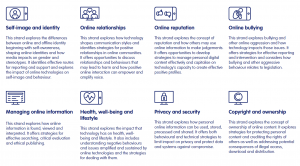Online Safety
It is everyone’s responsibility to safeguard children.
Keeping safe online is an important message that we regularly give to our children and this is a key theme of our Computing Curriculum and our wider curriculum.
Our Computing Curriculum explicitly incorporates one of our ‘Lifelong Literacies’- Digital Literacy. Our aim for our Digital Literacy focus is to empower learners to think critically, behave safely, and participate responsibly in our digital world.
We have taken age-appropriate outcomes from Education for a Connected World- UK Council for Child Internet Safety (UKCIS), which gives guidance to support children to live knowledgeably, responsibly and safely in a digital world. This framework focuses on eight strands of online education:

It can be found in hard copy here or in next version under Project Evolve here
Our approach enables us to ensure that our curriculum for our children aligns with Keeping Children Safe in Education (KCSIE) 2022, which states that the breadth of issues classified within online safety is considerable and ever evolving, but can be categorised into four areas of risk:
Content: being exposed to illegal, inappropriate, or harmful content, for example:
pornography, fake news, racism, misogyny, self-harm, suicide, anti-Semitism,
radicalisation, and extremism.
Contact: being subjected to harmful online interaction with other users; for example:
peer to peer pressure, commercial advertising and adults posing as children or young
adults with the intention to groom or exploit them for sexual, criminal, financial or other
purposes.
Conduct: online behaviour that increases the likelihood of, or causes, harm; for
example, making, sending and receiving explicit images (e.g. consensual and nonconsensual sharing of nudes and semi-nudes and/or pornography, sharing other explicit images and online bullying, and
Commerce: risks such as online gambling, inappropriate advertising, phishing and or financial scams.
Working and keeping safe in our community
We link with our local PCSOs on Online Safety, regularly inviting them to come into school to supplement the messages that we give in assemblies and in class.
We regularly communicate with parents and give messages on supervising their child’s online activity and censoring what they may access.
We have ‘Be Safe’ weeks throughout the year and we share messages to parents and children if a concern occurs in school or in our wider society and as part of our regular information sharing with parents.
We expect all children to sign an agreement to keep safe online.
Acceptable Internet Use Agreement for Learners:
Acceptable Use Agreement – Children Key Stage 1
Acceptable Use Agreement – Children Key Stage 2
Acceptable Internet Use Agreement for Parents and Carers:
Acceptable Use Agreement – Parents and Carers
If you are concerned about any interaction or behaviours online, please report here.
Here is our Online Safety Policy: